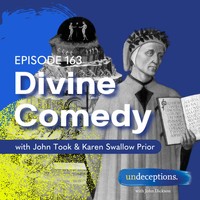

#4177
Mentioned in 10 episodes
Commedia
Divine Comedy
Book •
Dante Alighieri's 'Divine Comedy' is an epic poem that journeys through the realms of the afterlife: Inferno (Hell), Purgatorio (Purgatory), and Paradiso (Heaven).
Guided first by the Roman poet Virgil and later by his idealized Beatrice, Dante explores the spiritual and moral nature of humanity.
The poem is rich with allegorical and symbolic meaning, reflecting medieval theology, philosophy, and political thought.
Through vivid imagery and profound introspection, Dante critiques earthly corruption and aspires to divine understanding.
'Divine Comedy' remains a cornerstone of Italian literature and a seminal work in the Western canon, influencing art, literature, and thought for centuries.
Guided first by the Roman poet Virgil and later by his idealized Beatrice, Dante explores the spiritual and moral nature of humanity.
The poem is rich with allegorical and symbolic meaning, reflecting medieval theology, philosophy, and political thought.
Through vivid imagery and profound introspection, Dante critiques earthly corruption and aspires to divine understanding.
'Divine Comedy' remains a cornerstone of Italian literature and a seminal work in the Western canon, influencing art, literature, and thought for centuries.
Mentioned by














Mentioned in 10 episodes
Mentioned as one of the secondary books used for the pastor's guild.

23 snips
Answering Patron Questions
Mentioned by 



Mary Beard

20 snips
A Trip To The Underworld
Menzionato da 



Alessandro Barbero

13 snips
Il Medioevo: ponte verso il RINASCIMENTO - Alessandro Barbero (Australia, 2025)
Mentioned in relation to the envious on Mount Purgatory having their eyelids sewn shut.

12 snips
Waiting in Action
Mentioned when discussing Martin Hägglund's book 'This Life' and the relationship between Dante and Beatrice.

11 snips
Amor Mundi Part 1: Unchained from Our Sun / Miroslav Volf's 2025 Gifford Lectures
Mentioned as one of Italy's most famous works of literature, performed by the Teatro Pathologico.

Australian state passes gun control laws after Bondi attacks
Mentioned by ![undefined]()


Joe

Episode 365 - The War of the Oaken Bucket
Mentioned by ![undefined]()


Hannah Skoda

International security & rough sleeping: history behind the headlines
Referenced by ![undefined]()


James Finley

T.S. Eliot: Session 4
Referenced as an epic poem and one of the most important works of Western literature.

163. Divine Comedy
Mentioned as the author who made a greater impact on Lewis than on Tolkien.

Getting to Know Tolkien and Lewis and Why It's Worth Your Time I Prof. Lee Oser
Mentioned by ![undefined]()


Jerry Saltz

Athlete Statues, Reviewed by Pulitzer-Winning Art Critic Jerry Saltz (PTFO Vault)
Mentioned as the trilogy 



Mary Jo Bang

After 20 years, Mary Jo Bang has completed her translation of Dante's 'Divine Comedy'
Mentioned by ![undefined]()


Mattie Lubchansky

T. Dan Smith
Mentioned as an example of a work that uses the nine-rank system of angels.

EVERY Biblically Accurate Angel Explained
Mentioned by Greg Kelly and ![undefined]()


Joan Jonas

We’re drawn to the beauty of the ocean. An artist reveals why
Mentioned by 



Michael Knowles

Ep. 1841 - Dems Now Arguing JD Vance Is *Worse* Than Hitler



